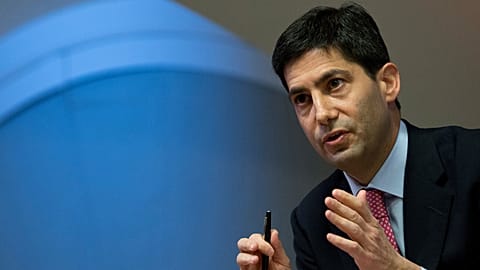Poorer economies are limiting investments in health, education, and the climate to avoid default and repay foreign lenders.
Developing countries spent a record $1.4tn (€1.3tn) to meet their foreign debt obligations in 2023, according to a new report from the World Bank.
This came after many economies were compelled to take on more foreign debt linked to the pandemic, said Tuesday's publication.
Last year, borrowing became more expensive as interest costs climbed to a 20-year high, a response to heightened inflation.
Depreciating local currencies and uncertainty over global growth also added to debt burdens - which were most acute in the poorest nations.
IDA countries, nations which receive help from the World Bank's International Development Association, paid $96.2bn (€91.9bn) to service their debt in 2023.
Within this, interest costs amounted to an all-time high of $34.6bn (€33.05bn).
On average, interest payments of IDA countries now amount to nearly 6% of the export earnings of IDA-eligible countries - a level that hasn’t been seen since 1999.
Private creditors step back
"Multilateral institutions have become the last lifeline for poor economies struggling to balance debt payments with spending on health, education, and other key development priorities," said Indermit Gill, the World Bank Group's chief economist and senior vice- president.
The World Bank noted that, during the period of financial instability last year, private creditors were extracting more money in debt payments from poorer regions than they were putting in through loans.
Securing large returns on more secure loans, these creditors felt less of an incentive to lend to poorer nations.
According to the new report, the World Bank and other multilateral institutions bucked this trend.
In 2022 and 2023, they dispersed nearly $51bn (€48.71bn) more than they collected in debt-service payments in IDA-eligible economies.
The World Bank accounted for a third of that sum - $28.1bn (€26.84).
"The risk-reward balance cannot be allowed to remain as lopsided as it is today." said the World Bank, "with multilateral institutions and government creditors bearing nearly all the risk and private creditors reaping nearly all the rewards".
Risk of default
The bank's report noted that most countries facing distress last year decided to ride out the storm rather than defaulting.
Nervous about the procurement of new loans, they sought to preserve their credit rating.
In order to repay creditors, however, this often entailed budgetary cuts in other areas, or money from the World Bank was channelled into paying alternative loans.
During periods of financial distress, the World Bank shifts from providing low-interest loans to providing grants to countries at high risk of distress.
The organisation is now working with borrowing countries to educate them on restructuring debt in a way that doesn’t require reduced social investment.
Widening inequality
Developing countries have been particularly affected by the post-pandemic economic fallout.
This is due to smaller fiscal stimulus offerings and weaker healthcare systems.
Current geopolitical tensions threaten growth further, as a number of countries move towards more insular trade policies.
On a more positive note, economic growth among low-income or middle-income economies showed some resilience in 2023, as measured by gross national income (GNI).
The debt-to-GNI ratio for low-income or middle-income economies excluding China decreased by 0.8 percentage point in 2023.
Countries eligible for IDA assistance showed a different pattern, said the World Bank.
The debt-to-GNI ratio of IDA-eligible countries increased by 1.9 percentage points in 2023.
In response to rising debt levels, Indermit Gill called for more protections for sovereign borrowers.
Just as businesses can restructure their debts, he argued that countries should be able to resort to similar measures without jeopardising their chance of securing new loans.
"In an era of great international mistrust, it will be a struggle to establish these precepts", he said.
"But, without them, all major development goals will remain in peril."


















